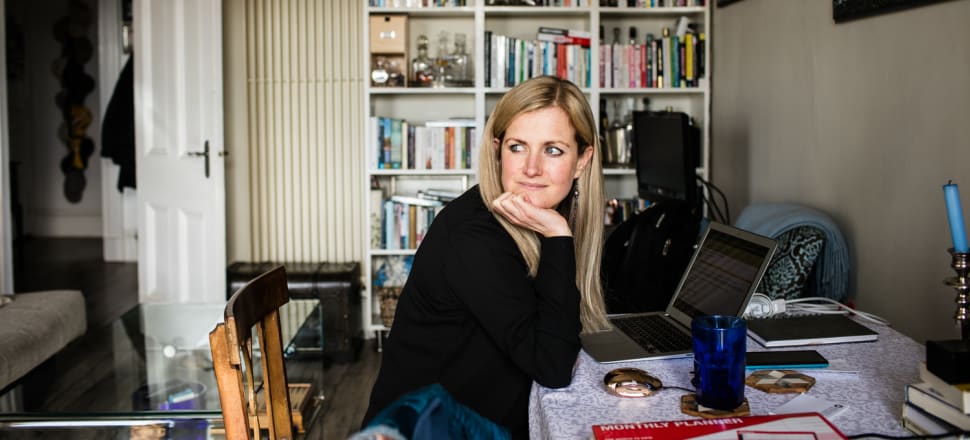
Wellbeing Economy Alliance co-founder Katherine Trebeck is to meet with the finance minister before the Budget – and says her message won't be diplomatic
When Katherine Trebeck first met New Zealand's finance minister, Grant Robertson, it was in the green room, before speaking together at the London School of Economics in 2019.
Robertson was preparing to reshape that year's Budget to count not just what the Government was spending, but to measure its outputs in enhancing wellbeing – measures such as inequality and child poverty.
"There was a real energy in the room," Trebeck recalls. "People were saying, these are the right sort of questions that New Zealand is asking – this is governing that's fit for the 21st Century, that New Zealand is showing the rest of the world."
But that was then.
READ MORE: * Rocks ahead! Leaders struggle at the helm of the world economy * Gareth Hughes: Budgets must do more than patch failures * Justin Connolly: Wellbeing budgets not a PR exercise
Today, the economist flies into Wellington on what's turned into somewhat of a rescue mission as she attempts to persuade Robertson to resume the Government's focus on wellbeing in this month's Budget and beyond.
She's dismayed at what she sees as backsliding since Chris Hipkins became Prime Minister, on defining matters such as a refusal to tax wealth, and aligning government agencies with a longterm view to enhance community wellbeing.
"I'm certainly never going to be a diplomat," she says.
"Now is not the time for New Zealand to be timorous on tax. New Zealand needs to really recognise that tax is an important instrument to not only generate revenue, but also to rebalance market inequalities and to incentivise the sorts of behaviours we want." – Katherine Trebeck, Wellbeing Economy Alliance
She's been brought here by this country's Wellbeing Economy Alliance hub, led by the former Green MP Gareth Hughes. Planning for her visit to New Zealand was underway even before the change in prime minister, but she says the Government's subsequent policy backtracks have given it new urgency.
"New Zealand really charged out on the global stage and got a lot of attention back in 2018-19, by announcing it was going to do its Wellbeing Budget," she says. "And the world really took notice of that.
"It really demonstrated to the rest of the world that this is possible, that political leaders can call out the inadequacies of more traditional recipes – the idea that if GDP growth is fine, we can ignore all the other signs that the current economic model is not delivering for enough people."

She'll meet Robertson on Wednesday. "I've been hearing that New Zealand wants to focus on bread and butter issues. And to me that is absolutely front and centre of the wellbeing economy agenda.
"Because the wellbeing economy agenda is saying, the current economic system isn't working – it's not delivering bread and butter issues for enough people.
"We see so many people struggling to put food on the table, to keep their houses warm, and we saw in Auckland and Hawke's Bay in recent months the impact of environmental breakdown."
She says governments have blindly put the economy and its growth first, rather than understanding that the economy is a tool to deliver wellbeing to the community. She rejects the position of neoliberals who believe that if the economy grows, the benefits will trickle down to everyone.
"There are those who are slightly more thoughtful, who would say we need these traditional economic recipes to deliver these social goals. But I'd say that route is flawed, given all the evidence we've got over the last few decades.
"But then there are others who take this almost lazy approach – and I don't mean to sound harsh – but this lazy view that the economy is a goal in its own right.
"There's this faith that you can let the market rip, and that will come through in competitiveness that will lead to the right set of outcomes. To be honest, I think that's a bit naive in terms of the exercise of power, and the way markets operate, and market capture.
"In New Zealand, I'm sure there are people with very, very good intent. But I'm sure there are also folks who are just out for themselves. You get that across societies."
She's been watching with concern the Inland Revenue and Treasury reports showing New Zealand's most wealthy households pay half the effective tax rates of average New Zealanders.
"Often the tax laws that enable that are written by accountants who also work for the very wealthy. They're advised by people who want to put in loopholes or design them in a certain way."
In particular, she's dismayed Hipkins has ruled out a capital gains tax or wealth tax in response.
"Now is not the time for New Zealand to be timorous on tax. New Zealand needs to really recognise that tax is an important instrument to not only generate revenue, but also to rebalance market inequalities and to incentivise the sorts of behaviours we want."
Her "four Ps" have been adopted by the Wellbeing Economy Alliance and its member countries – Scotland, Wales, Iceland, Finland, Canada, and New Zealand.
Purpose is about realigning the goal of the economy and the entities that constitute it with the needs of people and the planet. She cites New Zealand and Scotland's previous Wellbeing Budgets, which both link Budget spending and policy decisions to a wider set of goals rather than simple economic growth as measured by GDP.
Prevention is about tackling problems at their root cause, which she says is better than constantly putting Band-Aids on.
With horror, she talks of the example of stab-proof sleeping bags being handed out to homeless people in south Wales, rather than the root causes of homelessness being addressed. "The more people can earn enough to live on, the less need for food banks and tax credits to top up wages."
People power is ensuring everyone's at the table when budgets are designed. Initiatives such as participatory budgeting, where public money is deployed according to what local people decide, are happening from New York to Brazil. And citizens’ assemblies are happening in France, Scotland, Ireland and beyond.
Already, an experimental, deliberative democracy process has been used by Watercare to get input from Aucklanders on future water sources, after being issued its last consent to draw drinking water from the Waikato River. Assembly members, selected from those who responded to 12,000 invitations issued randomly using NZ Post and Watercare databases, learned about water supply options from multiple perspectives.
They had discussions with local and international experts, including mana whenua representatives, Auckland Council and Watercare, before deliberating and drafting recommendations. The process was designed by a team led by the University of Auckland's Dr Tatjana Buklijas, with MBIE Smart Ideas research funding, in collaboration with Watercare, and with advice from international academics and advocacy organisations.
"These initiatives bring everyday people into the heart of government decision-making," Trebeck says.
Finally, pre-distribution (by her own admission, a bit of a clunky term) is essentially about getting the economy to do more of the heavy lifting, so outcomes are fairer in the first place and less government intervention is needed to moderate the gap between rich and poor.
"Businesses whose mission is something other than short-term profit are vital. Wage ratios, living wages and flourishing local enterprises would also fit near this corner of the jigsaw.
"There are worker cooperatives – such as the global engineering firm Arup, and in the UK, businesses such as John Lewis and Go Ape – where workers are partners, and the purpose of the enterprise is to deliver benefits for them, rather than extract financial wealth upwards to remote shareholders.
"The community wealth-building efforts of towns such as Preston in northern England and Cleveland in the US show how local governments can use their procurement policies for the benefit of local people and support local suppliers to keep money circulating in the community."







